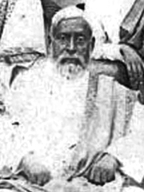Chaudhuri, Rai Parbati Sankar

Chaudhuri, Rai Parbati Sankar (1853-1918) a scion of the zamindar family of teota, and a noted philanthropist and an improving landlord. Son of Jaysankar Chaudhuri, Parbati Sankar Chaudhuri was educated at the Hindu School, Calcutta, from where he not only passed the Entrance examination with distinction, but also won a scholarship. He however did not continue with his studies, and started supervising the affairs of the Teota zamindari from a fairly young age.
He was a noted philanthropist and a 'progressive' landholder. He made significant efforts towards the economic and social development of the region, and attempted at least two significant innovations within the estates of the Teota Zamindar, one of which was very successful. He was one of the founders of the indian industrial association, and was a prominent and active member of the district board of Dacca, the British Indian Association, the Indian Association, etc.
Initially helped by his elder cousin, raja shyama sankar ray, his greatest achievement was the dharmagola (a co-operative grain bank), established with the objective of fighting deprivation caused by famine and scarcity. In Dinajpur, the first co-operative grain bank was started under the supervision of the Joyganj (Thakurgaon subdivision) kachari. Soon after it was started, this institution became very popular among the cultivators, and several other golas were set up in the Dinajpur circle of the zamindari. This example was also replicated in other estates of the Teota Raj, notably in Goalondo.
The basic principle on which it worked was that every member, besides paying an annual subscription of 8 annas for membership, deposited as much paddy as he could spare from the year's crop, in the bank. This fund was then utilised for distribution amongst the members either for seed, or in years of scarcity, for food ' every borrower repaying the bank 1' maunds for every maund borrowed, after harvesting his crop. The zamindar's contribution to the scheme was a 'fine, corrugated iron godown' at Joyganj, and other arrangements for storage, elsewhere.
Parbati Sankar also figures prominently in quite a few 'constructive Swadeshi' projects. In 1902, he formulated a detailed scheme for village grain banks to fight famine. The 'Dawn' (August-September 1902) published his scheme in full ' it covered 53 points. The idea was revived in 1907, but the proposal aroused little interest and the scheme seems to have remained mainly on paper, with the exception of the dharmagolas set up within the Teota estates.
Parbati Sankar Ray Chaudhuri was also one of the founders of the Indian Industrial Association. Among other things, its members experimented with indigenous raw materials; Parbati Sankar tried to manufacture tar and ink from the peat deposits in the family zamindari. An active member of the Dacca district board, he formulated very detailed plans for the extension of the railways from Dacca to Shivalaya-Manikanj, and tenaciously tried to convince the authorities of its necessity, and feasibility. Although he failed, his serious efforts were much appreciated by the people of Manikganj. Parbati Sankar Ray Chaudhuri died in 1918. [R Roy]
